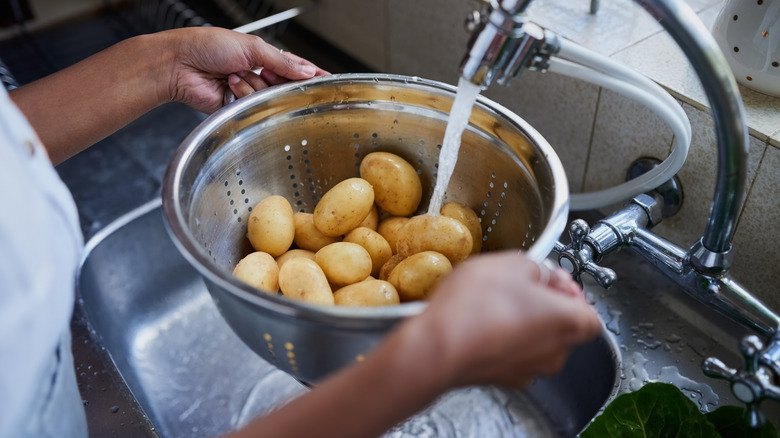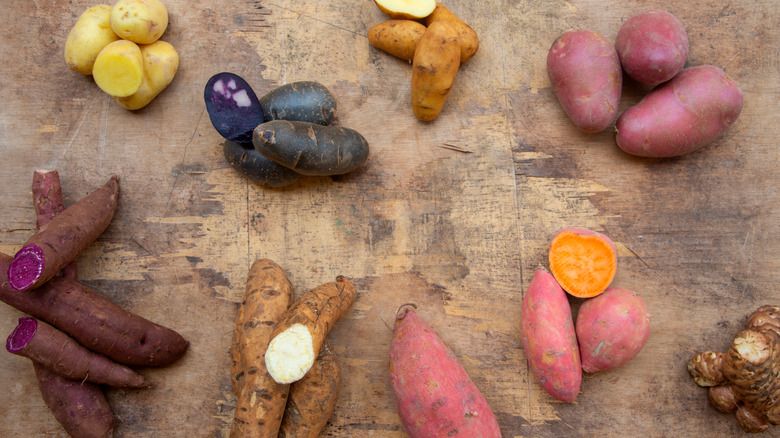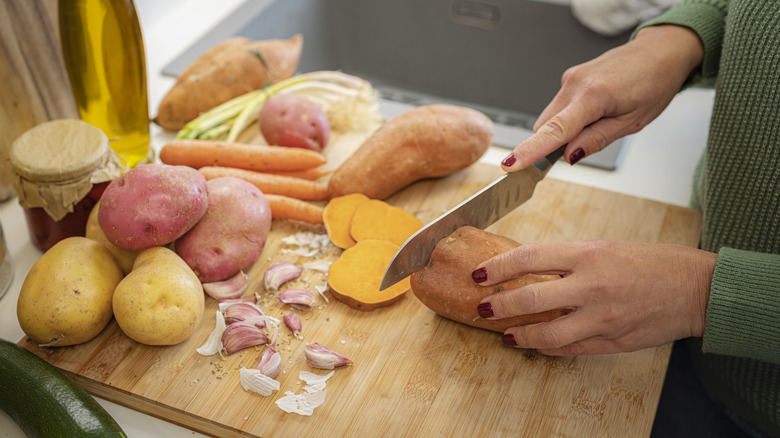Potatoes Have An Unexpected Amount Of Protein
Essential nutrients can be found in unlikely places, including protein. While lean meat, poultry, fish, and dairy can all be rich sources of protein, this nutrient may also be hiding elsewhere on your dinner plate — specifically, in your potatoes.
In one unsalted, cooked potato with the skin intact (136 grams), you'll find 2.45 grams of fiber, 515 milligrams of potassium, nearly 60 milligrams of phosphorus, approximately 30 milligrams of magnesium, and much more, reports the U.S. Department of Agriculture (USDA). When it comes to protein content, a potato contains 2.54 grams. Of course, potatoes can't compete with chicken or seafood when it comes to protein content, but they do come out on top in comparison to many other root vegetables. For example, in a 100-gram serving of cooked yam with salt, you'll find 1.49 grams of protein (via USDA) compared to the same-size serving of unsalted cooked potato, in which you'll find 1.87 grams of protein.
Do all potatoes have similar amounts of protein?
Are all potatoes equal when it comes to protein content? Here's what we found when we took a look at some of the numbers. In a 100-gram serving of unsalted, cooked sweet potato with the skin intact, you'll get 2.01 grams of protein (via USDA). That's even more than the 1.87 grams you'll find in the same-size serving of regular potatoes.
Even potatoes that come in the form of crunchy, golden french fries still have protein to offer. In a 100-gram serving of fast food potatoes french-fried in vegetable oil, you'll find 3.43 grams of protein (via USDA). Mind you, french fries can also be high in trans fat and sodium, and are therefore best consumed in moderation. In a 2017 longitudinal study published in The American Journal of Clinical Nutrition, researchers found that people who consumed fried potatoes two or more times each week stood at an increased risk of mortality. However, the researchers emphasized that many additional factors likely contribute to this correlation.
The healthiest ways to cook potatoes
Some cooking methods will do a better job of preserving a potato's nutrients than others. "The best way to eat a potato is in its whole, unprocessed form," Victoria Jarzabkowski, a nutritionist with the Fitness Institute of Texas at the University of Texas at Austin, told LiveScience. Boiling a skinless potato will result in the greatest amount of nutrients lost, while baking, microwaving, or steaming the vegetable with the skin intact will help preserve these nutrients, including B vitamins, vitamin C, calcium, and potassium.
While potatoes may harbor more protein than you might have expected, it's important to diversify our sources of protein rather than relying on any one specific food. Both animal and plant foods can provide us with ample amounts of protein, including seeds, nuts, milk, eggs, beans, lentils, and more (via Better Health Channel). Presently, the U.S. Food and Drug Administration (FDA) advises consuming 50 grams of protein daily.


